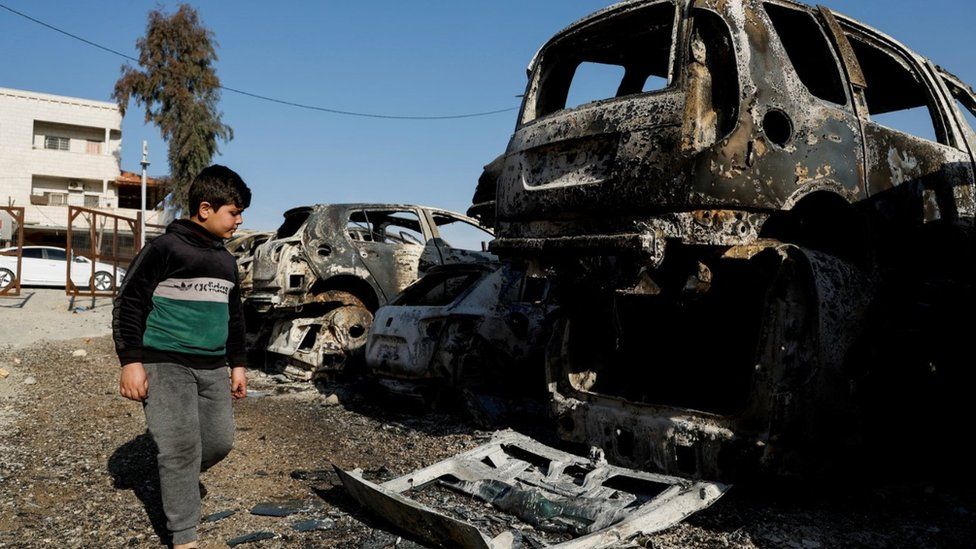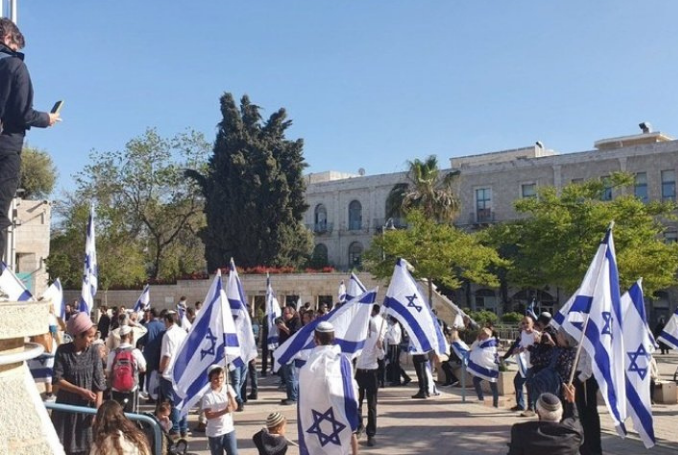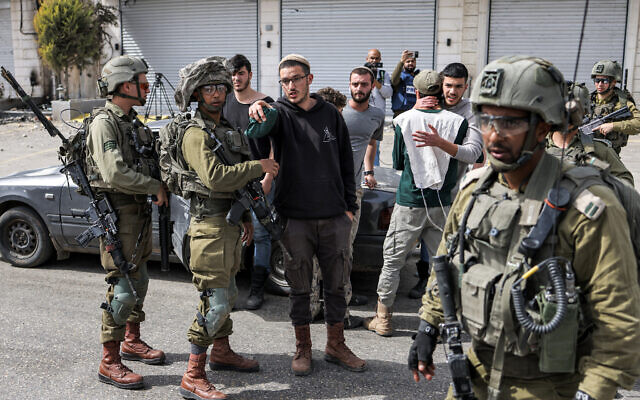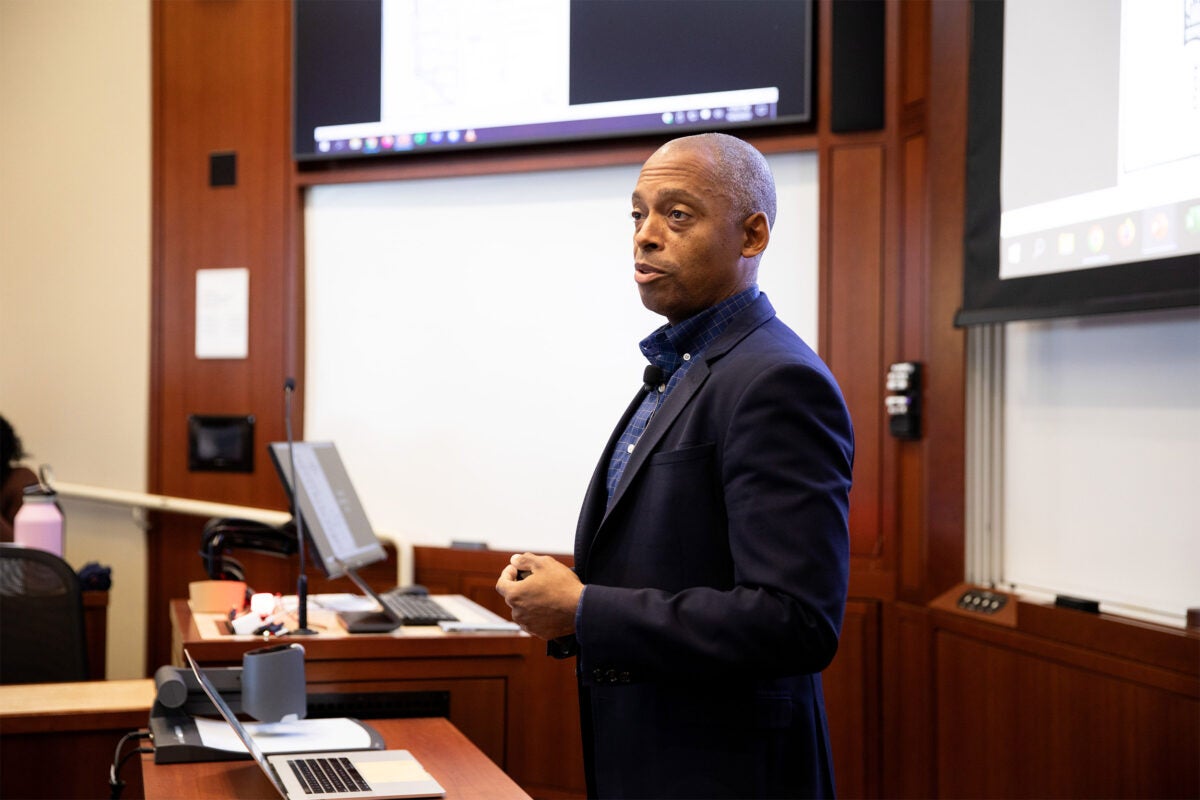Maj Gen Yehuda Fuchs says aggressors 'spreading terror'
The top Israeli general in charge of soldiers in the occupied West Bank has accused settlers who rampaged through a Palestinian town of carrying out a "pogrom" and spreading terror.
One Palestinian was killed and scores injured when hundreds of Israeli settlers ran through the streets of Hawara wielding iron bars and other weapons, setting fire to homes and cars after the fatal shooting of two Israelis by Palestinian gunmen.
Shops in the Palestinian village remained closed on army orders on Wednesday amid a heavy Israeli military presence, residents said.
"The incident in Huwara was a pogrom carried out by outlaws," Maj Gen Yehuda Fuchs told N12 News late on Tuesday.
A "pogrom" is a mob attack, approved or condoned by the authorities, against a religious, racial, or national minority.
On Wednesday, Israeli police said they had detained a further six suspects allegedly involved in the Hawara attack. Eight Israelis detained on the night of the rampage were released earlier in the week.
The condemnation of the violence from Maj Gen Fuchs came as the military submitted an inquiry to him on a separate attack by settlers against Israeli soldiers.
The incident involved Israeli citizens hurling rocks and other physical and verbal attacks, as well as "rapidly accelerating" a car towards soldiers, according to a statement released by the military.
:quality(70)/cloudfront-eu-central-1.images.arcpublishing.com/thenational/P5AWUWWWU3KSJO25LT2RBORSPI.jpg)
:quality(70)/cloudfront-eu-central-1.images.arcpublishing.com/thenational/ZW5BKCSWH2QXNMQ3RDH6PY3TOY.jpg)
:quality(70)/cloudfront-eu-central-1.images.arcpublishing.com/thenational/PVXHWCW54U4AXZ6S5UP25XQFXA.jpg)
:quality(70)/cloudfront-eu-central-1.images.arcpublishing.com/thenational/SZMXOBQS7P5RPNMROB2CSK75KY.jpg)
:quality(70)/cloudfront-eu-central-1.images.arcpublishing.com/thenational/SBZY3YLCWM225MOMXWJMDFFE3I.jpg)
:quality(70)/cloudfront-eu-central-1.images.arcpublishing.com/thenational/B4P7EZU6WR5BK4UZ5MEPPJ6IQQ.jpg)
:quality(70)/cloudfront-eu-central-1.images.arcpublishing.com/thenational/WI4YYL3SYEJQWODFX2VV4KMELM.jpg)
:quality(70)/cloudfront-eu-central-1.images.arcpublishing.com/thenational/WTHKP2V6SNHZVV2PQYZBEQQU2Y.jpg)
:quality(70)/cloudfront-eu-central-1.images.arcpublishing.com/thenational/YAVCYXPPSE7AQGHSAEQXDY3WB4.jpg)
Far-right National Security Minister Itamar Ben-Gvir called on people "not to take the law into their own hands", while his Jewish Power party has accused Prime Minister Benjamin Netanyahu of being weak on terrorism.
But the general said that the settlers involved in Sunday's violence were not applying justice.
“This is not a case of ‘taking the law into their own hands’ because law-abiding people do not spread terror among a population and don’t throw stones at people randomly,” he added.
He also told Israeli media that clashes between Israeli soldiers and settlers would eventually lead to deaths.
The confrontation between settlers and the military, one of whose main tasks is protecting settlements, comes as opposition Israeli politicians accuse the government of stoking tensions and failing to stem a deadly rise in violence between Palestinians and Israelis.
On Monday, opposition leader Yair Lapid said the government had "lost control" of the situation, placing blame at the feet of the "full-on right-wing government" led by Mr Netanyahu.
Palestinian Prime Minister Mohammad Shtayyeh, speaking during a visit to the village on Wednesday, said the arrests were not enough.
"We see an organised crime perpetrated by the Israeli government and carried out by the settlers," he said.
Late on Tuesday night, the Palestinian ambassador to the UN said the Security Council had a "responsibility to shoulder, especially with regard to ... taking steps to provide protection to the civilian population, especially after the criminal and terrorist act by settlers" in Hawara.
The international body was meeting at the request of the UAE and called for an end to the violence in the West Bank.
UAE's ambassador to the UN, Lana Nusseibeh, underlined the importance of promoting dialogue and diplomacy and called for "further talks" between Israeli and Palestinian officials.
Despite many calls for calm, there are fears that the rhetoric of some Israeli politicians and officials could worsen an already tense situation.
READ MORE
UN Security Council calls for de-escalation after a wave of violence in occupied West Bank
After the attack on Hawara, National Security Committee head Zvika Fogel said Israel needed to "take the gloves off".
"I want to restore security for the residents of the state of Israel," he said. "How do we do that? We stop using the word ‘proportionality’. We stop with our objection to collective punishment."
On Tuesday, Israeli Minister of Public Diplomacy Galit Distel Atbaryan said that attacks on Israelis are "a fundamentalist religious war of brainwashed murderers who are programmed to seek Jewish blood since age zero".
Mr Netanyahu and Israeli Prime Minister Isaac Herzog both released statements condemning the violence in Hawara.
On Monday, the US released a report accusing Israel of not doing enough to prevent settler attacks in the West Bank.
With Ramadan and the Jewish Passover festival weeks away, foreign mediators have sought to reduce tensions, which surged after a spate of deadly Palestinian street attacks and lethal Israeli military raids.
"I'm worried," said US ambassador Tom Nides at Tel Aviv University's conference of the Institute for National Security Studies late on Tuesday.
"This is going to be a very complicated period of time we're about to walk into, we've got to keep things as calm as possible to keep things from getting out of control, which could easily happen."
:quality(70)/s3.amazonaws.com/arc-authors/thenational/fa7f6fac-fd8c-4c77-932a-aeb010097d1d.png)
Thomas Helm
Jerusalem
Mar 01, 2023
:quality(70)/cloudfront-eu-central-1.images.arcpublishing.com/thenational/H2RYEBSWCBBUCDTNXZSY3TAWMM.jpg)
:quality(70)/s3.amazonaws.com/arc-authors/thenational/9e2159fa-e4db-4215-b498-6b3607b75bee.png)














